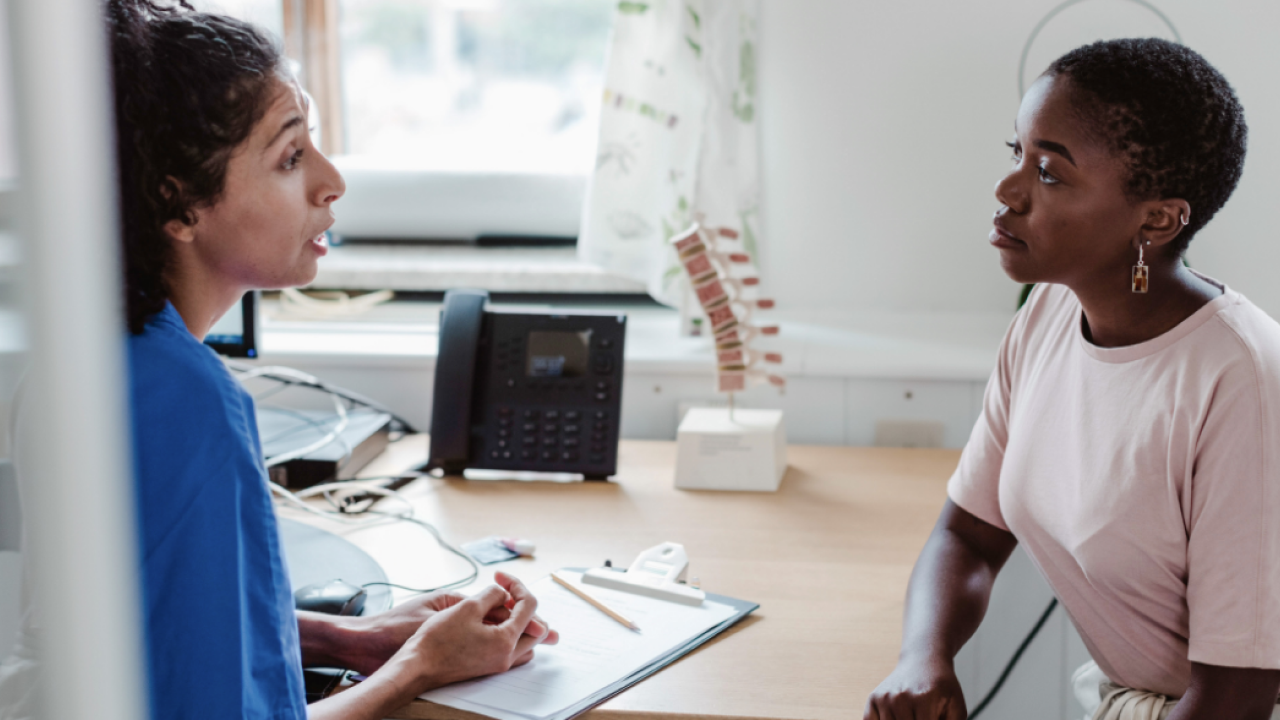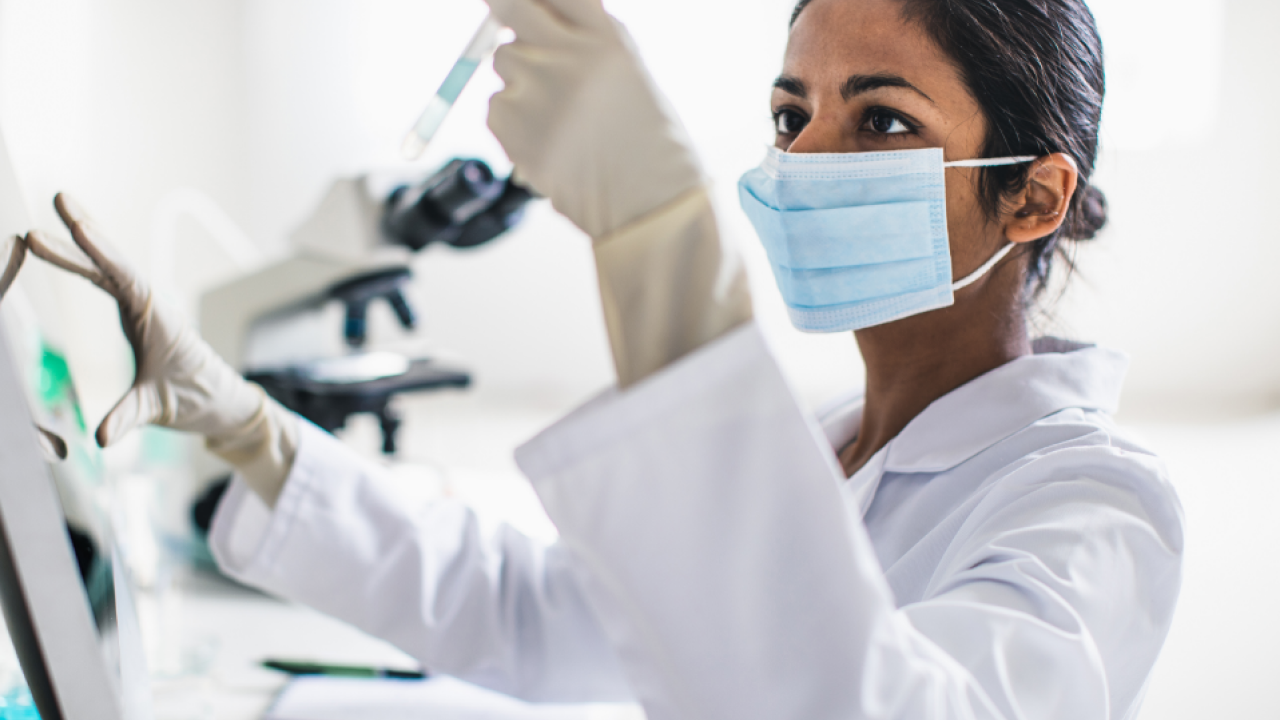Steps for genetic testing

Step 1: Clinically examine your patient
Clinically examine your patient (clinical eye examination, imaging, visual fields and electroretinography) and obtain their full medical and family history to establish a diagnosis of inherited retinal disease1,2
- The various testing procedures and the timing at which they are recommended are described for patients within 4 broad classes of IRD in the AAO 2022 Guidelines on Clinical Assessment of Patients with Inherited Retinal Degenerations2
- In some circumstances, your patient may have a family member with a positive genetic test result. If possible, order the same genetic panel as their tested family member
Step 2: Partner with a genetic counsellor or genetic specialist
Partner with a genetic counsellor who specialises in IRD genetic testing. Counsellors are valuable partners who can help determine the right test for the right patient at the right time.1,3
Step 3: Order the appropriate genetic test
Order the appropriate test for patients, importantly when a specific gene or small cluster of genes is suspected. For example, if the patient has a family member with an inherited retinal disease, or if their clinical diagnosis or phenotype is suggestive of a genetic disorder such as:3,4
- Achromatopsia
- Best disease
- Choroideremia
- Gyrate atrophy
- X-linked retinitis pigmentosa
- X-linked retinoschisis
Step 4: Collect a blood or saliva sample
Collect a blood or saliva sample and send to a specialist testing lab. The results can sometimes take several months to come through.5,6
Step 5: Discuss the results with your patients
Post-test genetic counselling is also important for interpreting and discussing genetic test results in light of patient history. Accurate interpretation of genetic test results is very important and will allow the genetic counsellor to advise patients about next steps, including potential treatment options and clinical trials.3
Genetic counsellors and you: a valuable partnership

Genetic counsellors can1,3:
- Determine the most appropriate tests for your patients and their families
- Answer questions about the testing process
- Explain the results to your patients and their families
- Facilitate family member testing
- Refer you to resources that could help your patients
- Offer emotional support to your patients
Some inherited retinal diseases may share similar symptoms with other eye conditions that do not have a primary genetic aetiology.7 Genetic tests may more precisely confirm your patients’ clinical diagnoses.8 Genetic counsellors can partner with you to determine the best course of action for your patients.1,3
From identification to management
Early genetic testing allows you to detect inherited retinal diseases sooner and uncover more possibilities for your patients such as, identifying at-risk family members, informing family planning and considering potential clinical trials and treatments.9,10


Take a look at how science has advanced through the years.

Stay informed
We would like to stay in touch with you to share updates on the latest medical and scientific developments, as well as resources to complement your patient care. Additionally, we'll keep you informed about both local and international events, including medical education accredited learning resources.
References
- Méjécase C et al. Ther Adv Ophthalmol. 2020;12:1-28.
- American Academy of Ophthalmology. Guidelines on Clinical Assessment of Patients with Inherited Retinal Degenerations – 2022. Available at: https://www.aao.org/education/clinical-statement/guidelines-on-clinical-assessment-of-patients-with. Last accessed: May 2024.
- Lam Bl et al. Orphanet Journal of Rare Diseases. 2021; 16:514.
- Moore AT. Ophthalmology. 2017;124(9):1254-1255.
- Prevent Blindness. Inherited Retinal Diseases. 2023. Available at: https://preventblindness.org/inherited-retinal-diseases/. Last accessed: May 2024.
- Foundation Fighting Blindness. Genetic Testing For Retinal Degenerative Diseases: Information and Resources for Affected Individuals, Families and Health Care Providers. 2023. Available at: https://www.fightingblindness.org/genetic-testing-for-retinal-degenerative-diseases-information-and-resources-for-affected-individuals-families-and-health-care-providers. Last accessed: May 2024.
- Biasella F et al. Front. Immunol. 2023;14: 1147037.
- Branham K et al. Am J Med Genet C Semin Med Genet. 2020; 184(3):571-577.
- Suppiej A et al. Ital J Pediatr. 2019; 45(1):168.
- Birtel J et al. Klin Monbl Augenheilkd. 2021; 238(3):249–259.
Partnering with a genetic counsellor or specialist to help set clear expectations for patients before and after genetic testing is important1
Before the genetic test, reassure your patients:
- They are taking an active role in their eye health by choosing to get a genetic test2
- Genetic testing can help confirm an inherited retinal disease diagnosis, but it does not always guarantee one3
- No matter what the results may show, being more informed helps patients make educated decisions about their health and their future4,5
- While many inherited retinal disease-related genes have been identified, there are many more yet to be discovered, which may explain why testing may yield a negative or inconclusive result in some cases1,6
- Sometimes, results may provide insights into their future risk for eye disease, as well as the potential to prevent and treat any systemic complications associated with inherited retinal diseases2,7
After the genetic test, if an inherited retinal disease diagnosis is confirmed, your patients may want to know:
- How having an inherited retinal disease will impact their vision over their lifetime8
- What lifestyle changes they will need to make, such as career choices and living arrangements8
- If their family members may be at risk9
- How inherited retinal diseases might affect family planning8
- If they are eligible for a clinical trial for an emerging therapy3
- If there are any effective treatment options currently available3
- If there are low-vision specialists who can provide guidance about everyday tools and vision aids they can use8
- If there are any support groups they can join10
If a genetic test is negative or inconclusive, your patients may want to know that:
- A negative or inconclusive result does not rule out a genetic cause1,3
- There are many reasons for negative or inconclusive test results. It could be because the tests didn’t locate the gene variant. It could mean the eye issues are part of a syndromic condition involving other organs1,11
- Science is constantly evolving, and the improvement of genetic laboratory techniques hasve led to the identification of the genetic basis of disease in 56-76% of patients with IRDs6
- Partnering with a genetic counsellor can help patients interpret and understand their genetic information, and determine if retesting is an appropriate next step3,12
Genetic counsellors and specialists and you: a valuable partnership

Genetic counsellors and specialists can:1,3
- Determine the most appropriate tests for your patients and their families
- Answer questions about the testing process
- Explain the results to your patients and their families
- Facilitate family member testing
- Refer you to resources that could help your patients
- Offer emotional support to your patients
Some inherited retinal diseases may share similar symptoms with other eye conditions that do not have a primary genetic aetiology.13 Genetic tests may more precisely confirm your patients’ clinical diagnoses.6 Genetic counsellors can partner with you to determine the best course of action for your patients.1,3
From identification to management
Early genetic testing allows you to detect inherited retinal diseases sooner and uncover more possibilities for your patients such as, identifying at-risk family members, informing individual and family planning and considering potential clinical trials and treatments.4,5


Take a look at how science has advanced through the years.

Stay informed
We would like to stay in touch with you to share updates on the latest medical and scientific developments, as well as resources to complement your patient care. Additionally, we'll keep you informed about both local and international events, including medical education accredited learning resources.
References
- Méjécase C et al. Ther Adv Ophthalmol. 2020; 12:1-28.
- Britten-Jones et al. Scientific Reports. 2024; 4,5403.
- Lam Bl et al. Orphanet Journal of Rare Diseases. 2021; 16:514.
- Suppiej A et al. Ital J Pediatr. 2019; 45(1):168.
- Birtel J et al. Klin Monbl Augenheilkd. 2021; 238(3):249–259.
- Branham K et al. Am J Med Genet C Semin Med Genet. 2020; 184(3):571-577.
- Moore AT. Ophthalmology. 2017; 124(9):1254-1255.
- Willis TA et al. Br J Ophthalmol. 2013; 97(9):1148-1154.
- Combs R et al. Eur J Hum Genet. 2013; 21(11):1209-1213.
- National Organization for Rare Disorders. Community Support. Available at: https://rarediseases.org/community-support/. Last accessed: May 2024.
- Tatour Y et al. Diagnostics. 2020; 10(10):779.
- Foundation Fighting Blindness. Genetic testing for retinal degenerative diseases: information and resources for affected individuals, families and health care providers. Available at: https://www.fightingblindness.org/genetic-testing-for-retinal-degenerative-diseases-information-andresources-for-affected-individuals-families-and-health-care-providers. Last accessed: May 2024.
- Biasella F et al. Front. Immunol. 2023;14: 1147037.